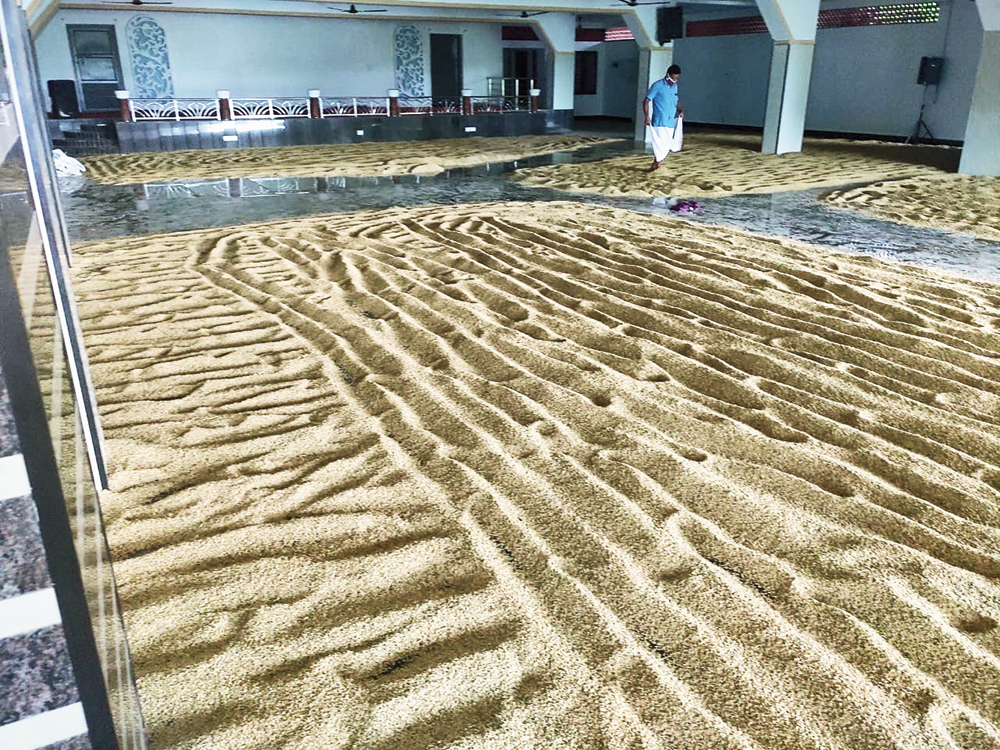Bushels of paddy are carpeting two community halls that usually host wedding feasts because a church and a temple in Kerala have opened their doors to farmers to dry their Covid-delayed harvest that clashed with the monsoon.
The gesture from shrines representing two faiths came to the rescue of farmers in a village in Thrissur, the cultural capital of the state, when they were staring at the possibility of their crop being destroyed by the rain-induced moisture.
The paddy would normally have been harvested in mid-May, almost a fortnight before the monsoon arrives in Kerala. But this time, with the virus-related lockdown affecting inter-state movement, many labourers who operate the harvesting machines could not reach the state from neighbouring Tamil Nadu.
By the time the easing of restrictions had allowed the return of the labourers, the monsoon too had arrived in Kerala, spreading panic among the farmers in Nadathara village.
The harvest from more than 40 acres of paddy fields in the village had been packed in large bags and stacked on the roadside when the rains started. The farmers approached the local panchayat.
“The farmers were struggling to find space to store the paddy they had just harvested since the monsoon had started,” P.R. Rajith, president of the Nadathara panchayat, told The Telegraph on Friday.
The panchayat leaders spoke to the authorities of the Nithya Sahaya Matha Church and the Sree Rudhiramala Bhagavathy Temple, both located in Nadathara. (“Nithya Sahaya Matha” means “Our Lady of Perpetual Help”, a Roman Catholic title for the Blessed Virgin Mary, while the temple is a shrine to a Devi.)
“Both the church and the temple immediately offered their community halls free of cost to the farmers,” said Rajith, a local CPM leader. The panchayat is controlled by the Left Democratic Front.
Of the thousands of places of worship in Kerala, many have their own community halls that are rented out for the feasts after the weddings have been solemnised inside the shrines.
Many had converted these halls into relief camps for flood victims in 2018 and 2019. The community halls had been lying idle since the coronavirus-induced lockdown began on March 25.
“The generosity of the church and the temple will certainly be an inspiration for others to open their community halls to help farmers,” said Rajith.
“I’m personally happy that the church and the temple did not think twice before allowing farmers to dry their paddy under the roofs of the halls.”
The 40-odd farmers whose paddy crop has been spread out in the two halls are frequently churning the harvest to aid the evaporation of the excess moisture under the community hall ceiling fans. As the tiled floors of the community halls are clean, the farmers don’t need to worry about hygiene.
“If not for these two halls, we would have lost the fruits of our labour,” said Rajesh Pottekkat, whose three acres of fields had yielded 3.5 tonnes of paddy.
“The monsoon season had already arrived when we harvested the paddy. Had we left the paddy outdoors, it would have sprouted in the rain.”
The mills don’t buy sprouted paddy. Besides, had the farmers been unable to dry their crop, the mills would not have bought the produce because moist crop weighs more.
The farmers of Nadathara had sown a special variety of paddy developed by the Kerala Agricultural University, Thrissur.
“This (pre-monsoon) harvest requires proper protection. We don’t have such worries about the February crop as the harvesting is done at the onset of summer,” Pottekkat said.
T.P. Aji, secretary of the temple, told this newspaper that the community hall was usually rented out for weddings and other religious events.
“But we didn’t think about the rent since the farmers were struggling to find a secure place for their paddy,” he said.
With the daily rent being Rs 8,000, the temple would notionally lose Rs 80,000 for the 10 days the farmers plan to use the hall before taking the harvest to the mills.
The church usually charge Rs 30,000 for its hall since it is bigger and better equipped for events.
“In any case, no one is hiring our hall for weddings because of the (pandemic) restrictions. So it doesn’t harm us in any way to allow the farmers to store their paddy in the hall,” Aji said.
While many utility halls in places of worship had accommodated thousands of displaced people during the floods of 2018 and 2019, the one at the Sree Rudhiramala Bhagavathy Temple had not been able to do so.
“Since our premises abut paddy fields, floodwaters had entered our compound. That’s why we could not convert the hall into a relief camp. But at least now we have been able to help our farmers,” Aji said.
The vicar of the Nithya Sahaya Matha Church could not be reached for comment.











